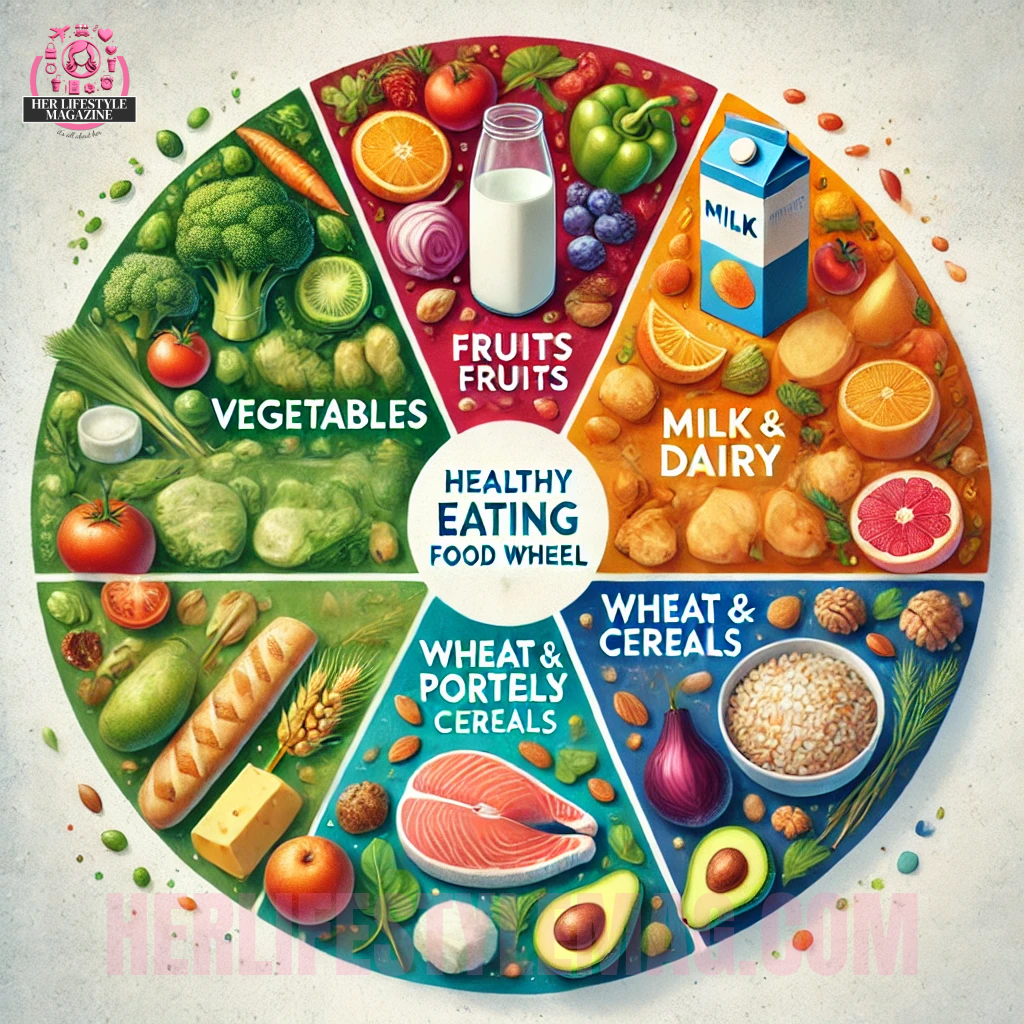They say eating healthy makes you live long—now, who wants to die young? Of course, nobody! So, my friend, it’s time to improve your diet and follow Food Wheel. In today’s fast-paced world, many people have become so engrossed in unhealthy (junk) eating habits that they rarely pause to consider their daily dietary intake. Convenience often takes precedence over nutrition, leading to severe health consequences in the long run.
But let’s face it: most of us make excuses for not maintaining a healthy eating routine. We claim we’re too busy, don’t have time to cook, or that healthy food is too expensive. However, the USDA (United States Department of Agriculture) solved this issue long ago by proposing a simple yet effective guideline—the Food Guide Wheel. This wheel suggests consuming something from each food group daily. Yes, it’s that simple! Just rotate with the wheel and ensure your body gets all the necessary nutrients to function optimally.
Understanding the Food Wheel
The Food Wheel consists of six essential food groups. By incorporating foods from each of these groups into your daily diet, you provide your body with the necessary vitamins, minerals, proteins, carbohydrates, and healthy fats required for overall well-being. Let’s take a deeper look at these groups:

1. Vegetables: The Powerhouse of Nutrients
Vegetables are packed with essential vitamins, minerals, fiber, and antioxidants. They help in digestion, boost immunity, and prevent various diseases. The beauty of vegetables is that they come in countless varieties, offering different health benefits.
Why Should You Eat Vegetables?
- Leafy greens like spinach, kale, and lettuce are rich in iron and folate.
- Carrots and sweet potatoes are excellent sources of beta-carotene, which promotes good eyesight.
- Cruciferous vegetables such as broccoli, cauliflower, and Brussels sprouts are packed with cancer-fighting compounds.
- Fiber-rich veggies like beans and lentils improve digestion and keep you full longer.
Cooking vegetables can sometimes destroy their essential nutrients, so try consuming raw options like cucumbers, tomatoes, and bell peppers in salads. If you must cook, opt for steaming or roasting rather than deep-frying.
2. Fruits: Nature’s Sweet Treats
It may sound surprising, but many people do not consume enough fruits. Fruits are natural sources of vitamins, minerals, and fiber. They provide energy and help the body fight diseases while keeping skin, hair, and organs healthy.
Why Should You Eat Fruits?
- Citrus fruits like oranges and lemons boost immunity due to their high vitamin C content.
- Apples and bananas provide natural sugars, making them excellent energy boosters.
- Berries like strawberries, blueberries, and raspberries are loaded with antioxidants that prevent aging and inflammation.
- Water-rich fruits like watermelon and cantaloupe help keep you hydrated.
Try starting your day with a fruit smoothie or simply snack on a bowl of mixed fruits in the evening. Aim for at least two to three servings of fruit daily for a well-balanced diet.
3. Milk and Dairy Products: Bone Builders
Many people avoid milk and dairy due to lactose intolerance or personal preference. However, dairy is one of the best sources of calcium, which is essential for strong bones and teeth.
Why Should You Eat Dairy?
- Milk is a complete food that contains protein, calcium, and essential vitamins.
- Yogurt is an excellent probiotic that promotes gut health and digestion.
- Cheese provides protein and healthy fats, but it should be consumed in moderation.
- Dairy products also contain phosphorus and vitamin D, both of which are crucial for bone health.
For those who dislike plain milk, consider flavored options or plant-based alternatives like almond milk, soy milk, or oat milk. Just ensure they are fortified with calcium and vitamin D.
4. Meat, Poultry, and Protein-Rich Foods: Muscle Builders
Proteins are the building blocks of the body. They play a crucial role in muscle repair, immune function, and overall cellular health. The best sources of protein come from meat, poultry, eggs, fish, and plant-based sources like legumes and nuts.
Why Should You Eat Protein-Rich Foods?
- Lean meats like chicken and turkey provide high-quality protein without excessive fat.
- Fish like salmon, tuna, and mackerel are rich in omega-3 fatty acids, which support brain health.
- Eggs are an inexpensive and versatile protein source packed with essential amino acids.
- Beans, lentils, and chickpeas are excellent plant-based protein options that also contain fiber.
To maintain a healthy diet, avoid excessive consumption of red meat and processed meats like sausages and hot dogs, as they are linked to various health risks.
5. Wheat and Cereals: Energy Providers
Carbohydrates have a bad reputation among those trying to lose weight. However, they are an essential energy source, especially when consumed in their whole form.
Why Should You Eat Whole Grains?
- Whole wheat bread, brown rice, and oats provide sustained energy throughout the day.
- Cereals are rich in fiber, which aids digestion and promotes a healthy gut.
- Whole grains like quinoa and barley offer essential nutrients like magnesium and iron.
Avoid refined grains like white bread, white rice, and processed cereals that strip away fiber and nutrients. Instead, opt for whole-grain versions to fuel your body effectively.
6. Fats: The Good, The Bad, and The Ugly
Fats are often misunderstood. While excessive fat consumption can lead to obesity and heart disease, eliminating fats entirely can cause skin dryness, hormonal imbalances, and vitamin deficiencies.
Why Should You Eat Healthy Fats?
- Avocados, nuts, and seeds provide healthy monounsaturated fats.
- Olive oil and coconut oil are excellent sources of heart-friendly fats.
- Fatty fish like salmon and mackerel are rich in omega-3 fatty acids, which support brain function.
Avoid trans fats found in processed foods like chips, fried snacks, and margarine. Instead, focus on natural and healthy fat sources to maintain overall well-being.
Final Thoughts: Balance is Key
The key to healthy eating is balance. Depriving yourself of any particular food group can lead to nutritional deficiencies, while overindulgence in unhealthy options can result in weight gain and chronic illnesses. By following the Food Wheel, you can ensure a well-rounded and nutritious diet that supports both your body and mind.
Quick Tips for a Healthy Diet:
✅ Eat a variety of foods from all six groups.
✅ Drink plenty of water to stay hydrated.
✅ Reduce your intake of processed and sugary foods.
✅ Incorporate physical activity into your daily routine.
✅ Listen to your body and eat in moderation.
Remember, food is not just about survival—it’s about nourishment and enjoyment. So, rotate with the food wheel and embark on a journey toward a healthier, happier, and longer life!






